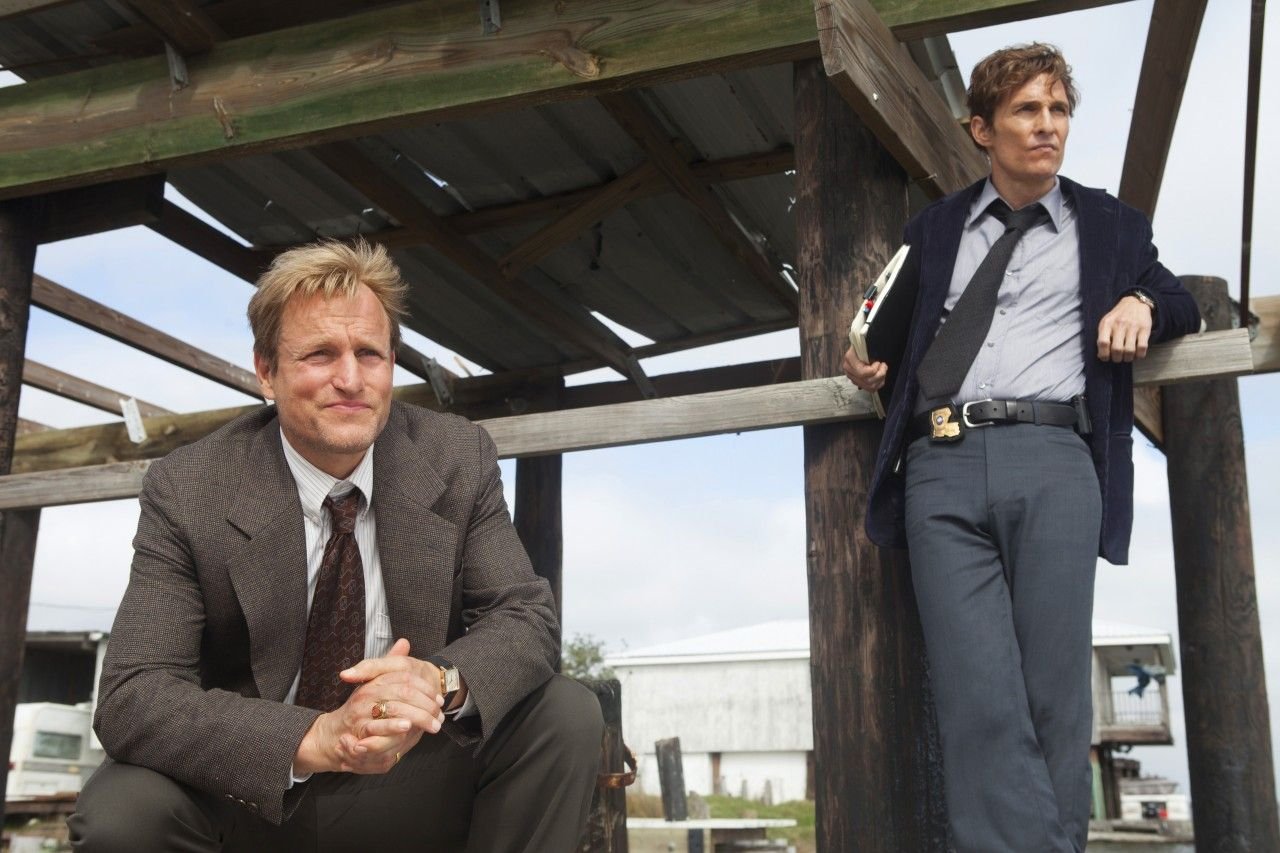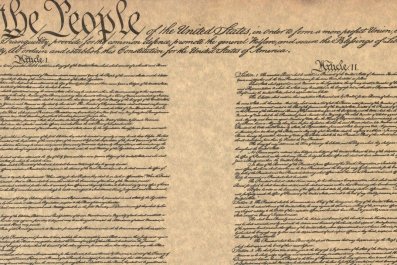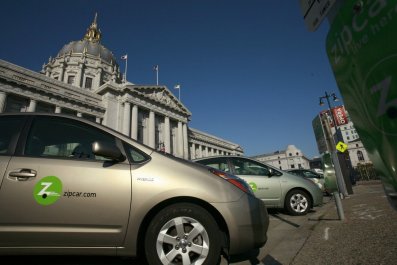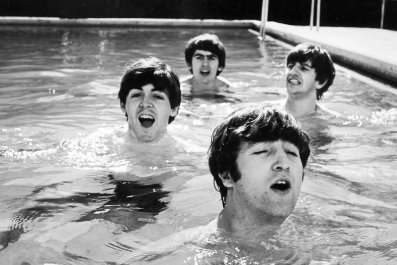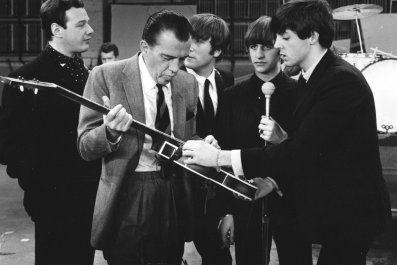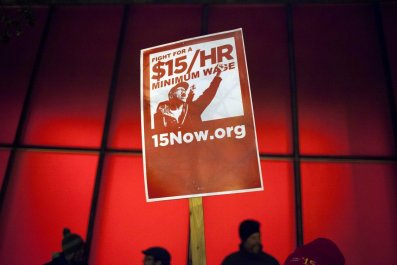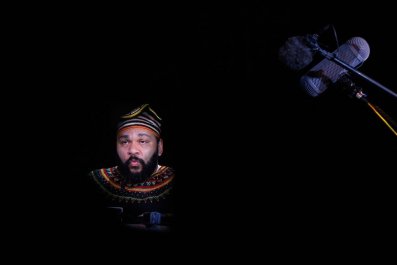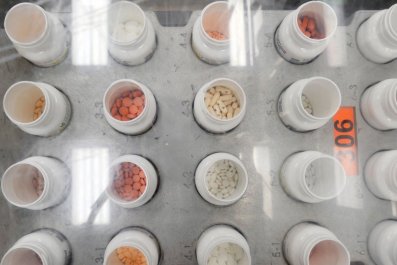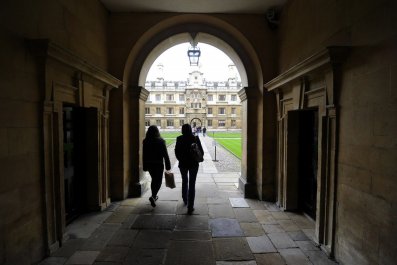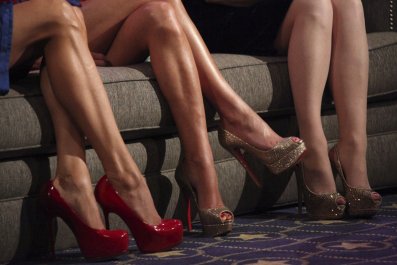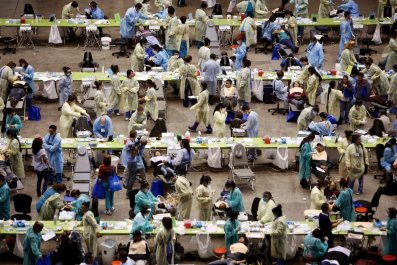Rust Cohle does not suffer fools - which is to say humanity - gladly.
"I think human consciousness was a tragic misstep in evolution," Cohle (Matthew McConaughey), a homicide detective in the belly of Cajun country, tells his partner, Marty Hart (Woody Harrelson), when asked to espouse his religious beliefs. "We are things that labor under the illusion of having a self... programmed with total assurance that we are each some body. When in fact, everybody's nobody."
This is one of the opening scenes in HBO's new series, True Detective. Two cops conversing in a squad vehicle is a trope that extends back to the days of Car 54, Where Are You? but the dialogue here, like the show, explores rarely plumbed depths.
"I think the honorable thing for our species to do," Cohle continues, "is deny our programming. Stop reproducing. Walk hand in hand into extinction. One last midnight. Brothers and sisters opting out of a raw deal."
Welcome to the dark psychosphere of television's most compelling character. Move over, Tony Soprano. Stand aside, Walter White. There's a new don of Sunday night cable television, and the only empire he covets is the space between his ears. Rust Cohle: an iconoclast who is fast gaining iconic status.
Just three episodes into its eight-episode run, True Detective has already established itself as a category-5 tempest of television drama. A visual novel, where near every scene and every character, even the minor ones, further establish the theme: the theme of contradiction.
"Contradiction and paradox are everywhere," says series creator Nic Pizzolatto, who is the show's sole writer. "Rust Cohle believes he is a nihilist, but he can't be a nihilist. He cares too much. He's too passionate about his job."
The series is set in the poor, rural southern Louisiana where Pizzolatto, a 38-year-old former English professor, was raised. It takes place in two distinct times: in 1995, when newly acquainted partners Cohle and Hart are confronted with a ritualistic murder of a young prostitute, Dora Lange; and in 2012, as both men, long removed from law enforcement, are interviewed separately by a pair of detectives after a fresh murder that closely resembles the one they had seemingly solved.
Pizzolatto is himself a contradiction: a Hollywood insider who reads books - writes them, in fact. His first novel, Galveston, was published by Scribner's in 2010. True Detective also began as a novel, but then Pizzolatto decided it would reach a greater audience as a serialized story. "I approached this show as the last thing I'd ever be allowed to do," says Pizzolatto, who was given near-total control for the series despite only having a writing credit or two from The Killing on his résumé. "To be honest, I had to fight a lot of battles. But once they gave me the keys to the Ferrari, well, I'm going to go as fast as I can."
In Cohle, Pizzolatto has created a unique character - two, actually. The younger version is sinewy and handsome; meticulous (peers call him "the Taxman" because he totes a giant ledger) and dedicated, and yet aloof: an antisocial Darwinist.
"What's your deal?" asks a hooker who also happens to supply Cohle downers to combat his insomnia.
"I don't have a deal."
"You seem kind of dangerous."
"Of course I'm dangerous. I'm police. I can do terrible things to people. With impunity."
The older Cohle is a ponytailed burnout who guzzles sixers of Lone Star while making "sh*t" a two-syllable word. He is also an uncanny intellect, playing the most entertaining game of cat-and-mouse since Dr. Lecter tossed out anagrams to Clarice Starling.
"Honestly, I never been in a room more than two minutes, I didn't know if someone had done it or not," Cohle, a former master of interrogation, tells the two detectives. Then, aware that the interview may be taking place under false pretenses, that he may be their suspect, Cohle adds a tease. "How long does it take you?"
Pizzolatto, who moved his family to Hollywood to break into television in 2010, says that Cohle simply came to him during a writing exercise. "I was writing long-form in a notebook, playing with voices, and Cohle's voice came fully formed. He says, 'Maybe not today, maybe not tomorrow, but I'm going to have a drink.' After that I couldn't wait to hear what he would say next."
The gospel according to Cohle is poetic if not pretty. Earth is "a giant gutter in outer space," he says. As for parenthood, "The hubris it must take to yank a soul out of nonexistence into this... meat. The force of life into this thresher."
Cohle saves his most withering contempt for organized religion. Standing at the edge of a tent-revival sermon in 1995, Cohle tells Hart, "If the only thing keeping a person decent is the expectation of divine reward, then, brother, that person is a piece of sh*t."
"I certainly feel that way," says Pizzolatto, while underlining the fact that Cohle is a character, not a mouthpiece. "But let me make this real easy. I'm not on anybody's side.
"I've had people ask me, 'Is this guy sympathetic?' I don't know. Who cares? I don't watch characters because they're sympathetic. I watch them because they're authentic. I didn't like Tony Soprano, but I couldn't take my eyes off him."
Don't let the show's title fool you. True Detective is not a whodunit as much as it is a whoarethey. A character study. Cohle assures Hart, "I'm not a maniac," while Hart assures an innocent man he had threatened to pummel, "I'm not some psycho." But as Pizzolatto says, "If you have to tell people you're not something, you probably are."
Counterpoints, polar opposites, contradictions - whatever you want to call them, they coat each episode like summer sweat. Hart versus Cohle. The younger Cohle versus the older Cohle. Even the Louisiana coast, where oil refineries rise against the horizon of primeval swamps, where ritual murder occurs within the Bible belt, is a contradiction. Pizzolatto refers to the show's setting as its third character.
And so Rust Cohle finds himself inhabiting Paradox Lost. "He wants a finer world," says Pizzolatto, "and it is in its absence that he's a misanthrope. Yet he spends his time in the service of people (murder victims) he'll never meet."
Who killed Dora Lange? Who cares? The mystery here is: Who is Rust Cohle?
"You are a stranger to yourself, and yet He knows you," an evangelist preacher sermonizes to a tent full of acolytes at the outset of the third episode. Or is he speaking directly to our troubled detective?



